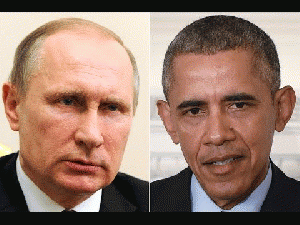Some sort of bargain is in play, of which we still don't know the details; that's what the CIA itself is basically saying through their multiple US Think Tankland mouthpieces. And that's the real meaning hidden under a carefully timed Barack Obama interview that, although inviting suspension of disbelief, reads like a major policy change document.
Obama invests in proverbial whitewashing, now admitting US intel did not specifically identify the Bashar al-Assad government as responsible for the Ghouta chemical attack. And then there are nuggets, such as Ukraine seen as not a vital interest of the US -- something that clashes head on with the Brzezinski doctrine. Or Saudi Arabia as freeloaders of US foreign policy -- something that provoked a fierce response from former Osama bin Laden pal and Saudi intel supremo Prince Turki.
Tradeoffs seem to be imminent. And that would imply a power shift has taken place above Obama -- who is essentially a messenger, a paperboy. Still that does not mean that the bellicose agendas of both the Pentagon and the CIA are now contained.
That caused damage, but the second part, which was to lure Russia into an war in Ukraine for which Ukrainians were to be the cannon fodder in the name of "democracy," failed miserably. Then there was the wishful thinking that Syria would suck Russia into a quagmire of Dubya in Iraq proportions -- but that also failed miserably with the current Russian time out.
The Kurdish factor
Convincing explanations for the (partial) Russian withdrawal from Syria are readily available. What matters is that the Khmeimim air base and the naval base in Tartus remain untouched. Key Russian military advisers/trainers remain in place. Air raids, ballistic missile launches from the Caspian or the Mediterranean -- everything remains operational. Russian air power continues to protect the forces deployed by Damascus and Tehran.As much as Russia may be downsizing, Iran (and Hezbollah) are not. Tehran has trained and weaponized key paramilitary forces -- thousands of soldiers from Iraq and Afghanistan fighting side by side with Hezbollah and the Syrian Arab Army (SAA). The SAA will keep advancing and establishing facts on the ground.
As the Geneva negotiations pick up, those facts are now relatively frozen. Which brings us to the key sticking point in Geneva -- which has got to be included in the possible grand bargain.
The grand bargain is based on the current ceasefire (or "cessation of hostilities") holding, which is far from a given. Assuming all these positions hold, a federal Syria could emerge, what could be dubbed Break Up Light.
Essentially, we would have three major provinces: a Sunnistan, a Kurdistan and a Cosmopolistan.
Sunnistan would include Deir ez-Zor and Raqqa, assuming the whole province may be extensively purged of ISIS/ISIL/Daesh.
Kurdistan would be in place all along the Turkish border -- something that would freak out Sultan Erdogan to Kingdom Come.
And Cosmopolistan would unite the Alawi/Christian/Druze/secular Sunni heart of Syria, or the Syria that works, from Damascus up to Latakia and Aleppo.
Syrian Kurds are already busy spinning that a federal Syria would be based on community spirit, not geographical confines.Ankara's response, predictably, has been harsh; any Kurdish federal system in northern Syria represents not only a red line but an "existential threat" to Turkey. Ankara may be falling under the illusion that Moscow, with its partial demobilizing, would look the other way if Erdogan orders a military invasion of northern Syria, as long as it does not touch Latakia province.
And yet, in the shadows, lurks the possibility that Russian intel may be ready to strike a deal with the Turkish military -- with the corollary that a possible removal of Sultan Erdogan would pave the way for the reestablishment of the Russia-Turkey friendship, essential for Eurasia integration.






